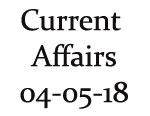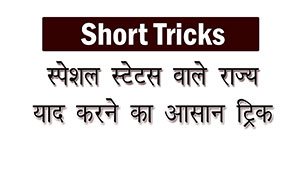-
Current Affairs 4th May 2018
Updated : 04-May-2018
Current Affairs 4th May 2018 - Important Points
- Cabinet doubles investment limit for senior citizens under which plan – PMVVY
- Restructuring of Indian Bureau of Mines approved by – Cabinet
- Cabinet approves accession to WHO protocol to eliminate illicit trade in - Tobacco products
- View Pension Passbook Service on Umang App launched by - EPFO
- Warning of another dust storm in UP, Rajasthan issued by - Meteorological Department
- 200th Unilateral Advance Pricing Agreement inked by - CBDT
Current Affairs 4th May 2018 - Details
Cabinet doubles investment limit for senior citizens under which plan – PMVVY
The Union Cabinet has sanctioned doubling of investment edge from Rupees 7.5 lakh to Rupees fifteen lakhs under PMVVY. It also stretched time limits for subscription from May 2018-March, 2020.
These decisions were granted as part of Government promise to financial inclusion and social security. It will enhance social security creativities for senior citizens and enable them up to Rupees 10,000 monthly pension.
Pradhan Mantri Vaya Vandana Yojana
Pradhan Mantri Vaya Vandana Yojana focuses to provide social security during old age and safeguard elderly persons aged 60 years and more than that against a future fall in their interest income due to indefinite market conditions. It is applied through LIC. The intended beneficiaries of the plan are elderly persons aged 60 years and more than that.
The plan provides a confirmed pension grounded on a guaranteed rate of return of 8 per cent annually for 10 years, with a choice to choose for pension on monthly, quarterly or half yearly and annual basis. The differential return of return produced by Life Insurance Corporation of India and confirmed return of 8 per cent annually is borne by Government as subsidy on annual basis.
Restructuring of Indian Bureau of Mines approved by – Cabinet
The Union Cabinet has sanctioned restructuring of Indian Bureau of Mines by upgradation, formation and abolition of certain positions of Joint Secretary-level and above than that. Decision in this regard was directed at Union Cabinet Meeting led by PM Narendra Modi in New Delhi.
Background
The Union Ministry of Mines had established Committee for comprehensive ‘Review and Restructuring of Functions and Role of Indian Bureau of Mines’ in the light of ‘National Mineral Policy’ 2008. The Committee presented its report in 2012 which was recognized by the Ministry.
Key Points
The restructuring will assist Indian Bureau of Mines to effectively release its function to benefit reform and transform the regulation of the mineral sector. It will enable Indian Bureau of Mines to adopt IT and space technology Indian Bureau of Mines to upgrade its effectiveness in mineral regulation and progress. Further, it will involve great deal of decision-making and responsibility in functioning of Indian Bureau of Mines. The upgraded and enhanced performance of Indian Bureau of Mines through restructuring will benefit the mining sector.
Indian Bureau of Mines
Indian Bureau of Mines was formed by Central Government in March, 1948 under Ministry of Works, Mines and Power. It is multi-disciplinary government unit involved in promotion of conservation, scientific progress of mineral resources and defence of environment in mines other than coal, atomic minerals, petroleum & natural gas and minor minerals. It is HD located at Nagpur, Maharashtra.
Cabinet approves accession to WHO protocol to eliminate illicit trade in - Tobacco products
The Union Cabinet has approved the consent to Protocol under World Health Organization Framework Convention on tobacco control to remove illicit trade in tobacco goods.
It will be appropriate to both smoking and chewing as negotiated and accepted under Article 15 of World Health Organization Framework Convention on Tobacco Control. India is a party to World Health Organization FCTC.
Features of Protocol to eliminate illicit trade in tobacco products :
It lays down responsibilities on parties and spells-out supply chain control measures that must be accepted by parties while licensing producers of tobacco products and machinery for production of tobacco items. It mainly handles those who are engaged in manufacturing, tracking and outlining regime, record keeping and security. It also spells-out actions to be taken by those involved in e-commerce, production in free-trade zones and duty-free sales. It publishes offences, enforcement measures, for instance, seizures and discarding seized products. It calls for international coordination in information sharing, maintaining, training, technical help and coordination in scientific and technical and technological issues.
Importance :
The protocol is path-breaking creativity in fortifying global action against tobacco. It is also new legal tool in public health. It is wide-ranging tool to counter and ultimately remove illegal business in tobacco products and fortifying legal dimensions for international health assistance.
View Pension Passbook Service on Umang App launched by - EPFO
Retirement fund body EPFO has initiated View Pension Passbook Service for pensioners on Umang
Application. This facility was initiated part of Employees’ Provident Fund Organisation’s plan to proceed
paperless by August this year and deliver all services online. It will permit pensioners view their pension
passbook on mobiles with the assistance of Umang application. Employees’ Provident Fund Organisation is already giving various e-services for its shareholders via Umang.
Umang appUnified Mobile Application for New-age Governance-
- UMANG app goals to develop common, unified platform and mobile phone app to ease single point of access for government services through mobile phone. It is multi-utility application and integrates with other main government services of Aadhaar, Rapid Assessment System, DigiLocker and Bharat Bill Payment System and many more and supports thirteen Indian languages.
- It has been established by Ministry of Electronics and Information Technology and National e-Governance Division. It had secured Best m-Government Service Award for Accessible Government Category at World Government Summit 2018.
Employee Provident Fund Organisation - Employees’ Provident Fund Organisation is Union Government’s constitutional body that works under the guidance of Ministry of Labour and Employment. It is HQ in New Delhi.
- It is one of largest social security organisations in India in terms volume of financial transactions undertaken and number of enclosed beneficiaries. It orders compulsory contributory Provident Fund Scheme (1952), Pension Scheme (1995) and Insurance Scheme (1976).
Warning of another dust storm in UP, Rajasthan issued by - Meteorological Department
Indian Meteorological Department has released warning of another dust-storm and thunder-storm in
parts of UP and Rajasthan. The satellite pictures have revealed wind pressure developing in 2 states
leading to thunder-storms, gusty winds and heavy rain. It also has predicted thunderstorm along with
squall is also more likely at isolated places over Uttarakhand, Sikkim, West Bengal and Odisha. The new
warning comes after 2 north Indian states were previous hit severe dust storm, which took lives of over
100 people and left trail of destruction.
Reasons for formation of rainstorms and duststorms- Thunderstorms and dust-storms produced from similar meteorological conditions.
- They are almost always headed and caused by spell of forceful heat. Thunder-storms occur when atmosphere has moisture and dust-storms occurs when moisture is absent. Such events take place due to local instability arising out of deviation from simple temperature difference between upper and lower atmosphere.
- In recent time rainstorms and dust-storms cases in UP and Rajasthan, moist easterly winds from Bay of Bengal stretched up to Himachal Pradesh colluded with dry winds from north-westerly direction.
- The two systems destabilised equilibrium temperature difference between upper and lower layers of atmosphere, leading to conducive conditions for thunderstorm and dust-storms. The final start, however, is development of largescale air-circulation system.
- Many parts of India witness build-up of surface heat during present time of year. The places that were hit by current storms had seen heat-wave like conditions.
200th Unilateral Advance Pricing Agreement inked by - CBDT
The Central Board of Direct Taxes has entered into 200th Unilateral Advance Pricing Agreement after it
inked one in April 2018. With the inking of this, Central Board of Direct Taxes has achieved another
milestone of having signed its 200th UAPA. The total number of Advance Pricing Agreements entered
into by Central Board of Direct Taxes so far has gone up to 220, which include 20 Bilateral APAs. The
UAPA entered in April, 2018 pertains to provision of sourcing support services.
Advance Pricing Agreement- Advance Pricing Agreement scheme released by Government endeavours to provide certainty to
taxpayers in domain of transfer pricing by stipulating methods of pricing and setting prices of
international transactions in advance. Its distribution was introduced in Income-tax Act, 1961 in 2012 and Rollback provisions to it were introduced in 2014. - The scheme gives certainty to MNCs that decide on certain principles in valuation of their cross-border transactions.
- It also facilitated them with substitute dispute resolution mechanism with respect to transfer pricing.
- It benefits in determining length price of international transactions in advance for max period of five coming years.
- The scheme focuses fortify Government’s resolution of fostering non-adversarial tax regime.
- It has meaningfully contributed towards refining ease of doing business in India and has been treasured nationally and internationally for being capable to address complex transfer pricing matters in a fair and transparent way.














